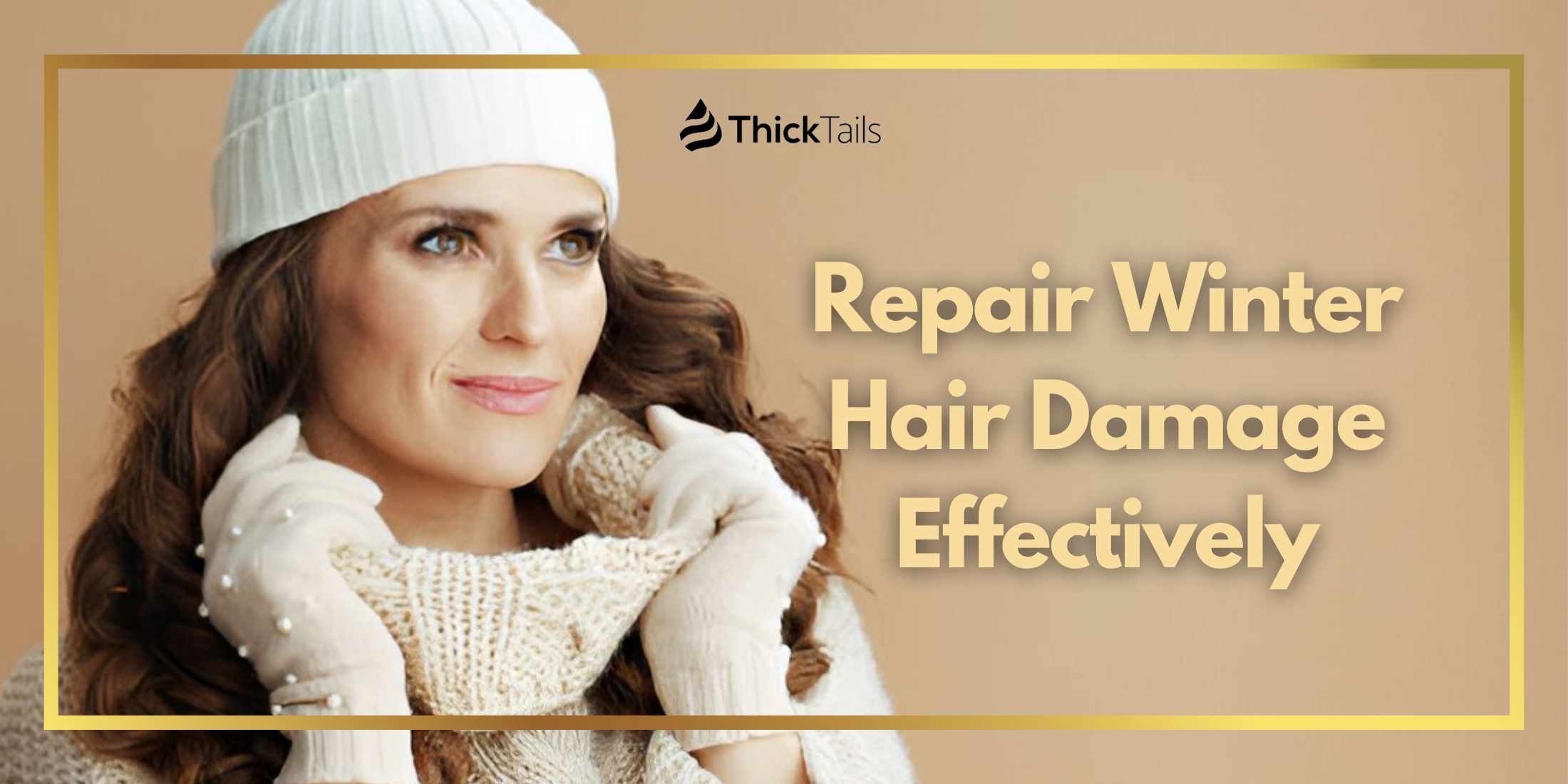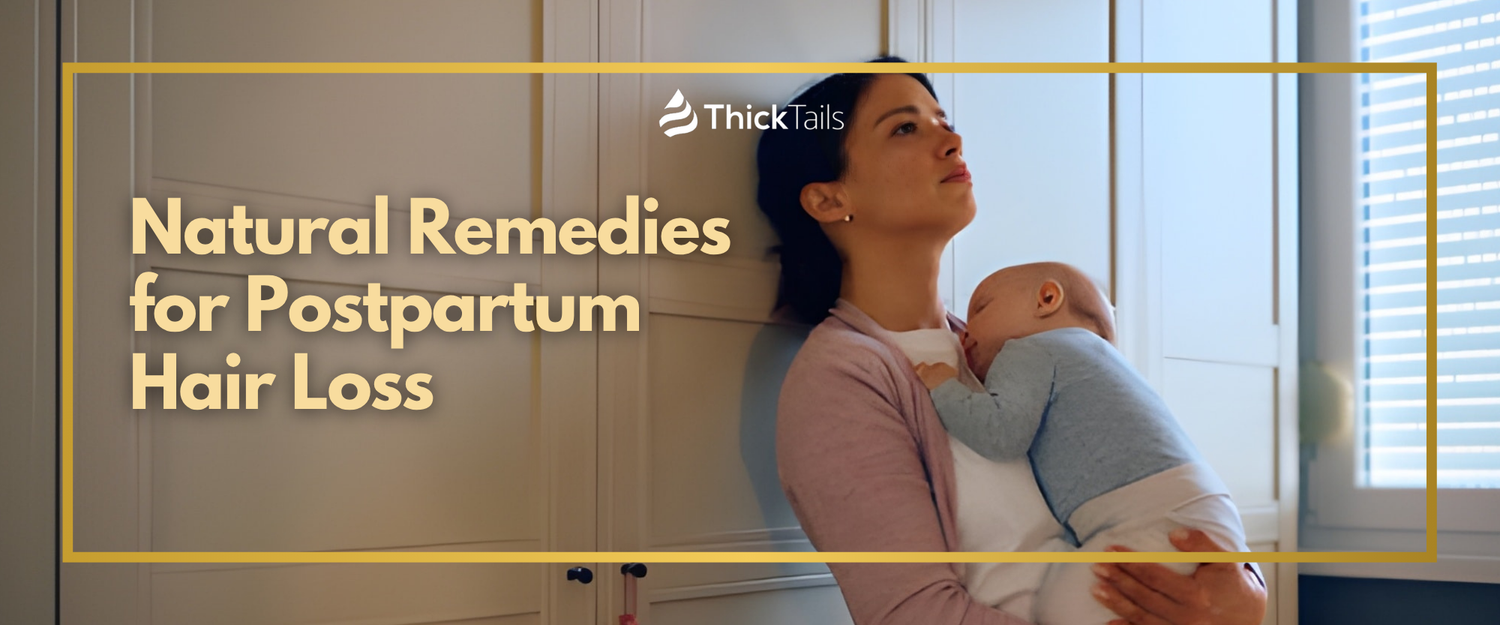As the winter season approaches, many of us often find ourselves battling with dry and damaged hair. And for women who are already going through menopause, postpartum recovery or managing stress levels, this struggle may feel even more overwhelming. The colder temperatures, lack of moisture in the air and constant use of heat styling tools can all contribute to causing hair damage. However, fear not! With the right approach and a few simple changes to your hair care routine, you can effectively repair and rejuvenate your locks just in time for spring. In this blog post, we'll dive into some expert tips on how to repair winter hair damage specifically tailored for women undergoing menopause or dealing with postpartum recovery or stress. So put down those heavy scarves that hide your troubled tresses and keep reading to learn how you can give your winter-damaged hair some much-needed TLC.
I. Common Winter Hair Issues

Winter is a season of joy, full of snowflakes and hot chocolate. But, this beautiful season can also bring with it hair challenges. Cold weather can take a toll on your hair, stripping it of moisture and leaving it dry and prone to breakage. You might notice that your hair gets frizzy, dull, and unmanageable during winters. This can happen to everyone, regardless of hair type. The good news is that there are plenty of ways to protect your hair during winters. By adopting a few hair care techniques, you can combat these common winter hair issues and keep your locks looking beautiful throughout the season. So, let's explore some tips and tricks to keep your tresses healthy, shiny, and nourished all winter long.
A. Dryness and Dehydration: Impact of Cold Weather on Hair
Winter hair can be a major issue for many people, and it's not just because the cold weather can make your hair feel dry and brittle. The combination of chilly temperatures outside and heated indoor environments can really take a toll on your hair's overall health and hydration level. This can lead to a number of issues, including split ends, breakage, and dullness. If you're struggling to keep your hair hydrated and healthy during the winter months, it's important to make some changes to your hair care routine. This might include using a deep conditioning treatment, avoiding excessive heat styling, and protecting your hair from the elements with a hat or scarf. With a little bit of extra attention, you can keep your locks looking luscious and healthy all winter long.
B. Split Ends and Breakage: Causes and Consequences
As winter approaches, it's important to take extra care of your hair to avoid split ends and breakage. But what exactly causes these hair dilemmas? Split ends are often a result of over-styling with hot tools such as curling irons and straighteners or using harsh chemicals like hair dyes. Breakage can also be caused by similar factors, but can also be linked to vitamin deficiencies or even stress. Regardless of the cause, split ends and breakage can have consequences such as making your hair appear dull and lifeless. To prevent further damage, it's important to invest in quality hair care products and limit the use of hot tools as much as possible.
C. Static and Frizz: Winter-Related Hair Frustrations
As the winter season rolls around, it's not uncommon to experience some frustrating changes to our hair. Static and frizz are two of the most common issues, which can leave us feeling less than confident about our locks. The colder temperatures and drier air can cause hair to become brittle and prone to breakage, resulting in static and flyaways. Additionally, the use of indoor heating can zap moisture from our hair, leading to frizz. Understanding the causes of these winter-related frustrations can help us better care for our hair and prevent these issues from escalating out of control. With the right techniques and products, we can keep our hair looking healthy and vibrant all winter long.
II. Effective Moisturizing Treatments
As winter sets in, so does the dryness in the air which can lead to brittle, lifeless hair. Moisturizing treatments provide a great solution to combat the harsh winter weather and restore moisture to your tresses. Effective moisturizing treatments typically include key ingredients such as shea butter, aloe vera, and natural oils that penetrate deep into the hair shaft and provide lasting hydration. A regular deep-conditioning treatment routine can work wonders in preventing damage, split ends, and breakage. In addition, using a leave-in conditioner or moisturizing hair oil can help seal in moisture and keep hair feeling soft and supple. Remember, with a little bit of extra care and attention, you can keep your hair looking healthy and vibrant all winter long.
A. Deep Conditioning Masks: Replenishing Moisture
Winter can be harsh on our hair, leaving it feeling dry and damaged. This is where deep conditioning masks come in, providing a rejuvenating boost of moisture. While regular conditioner can help with detangling and smoothing, a deep conditioning mask goes beyond the surface level to penetrate deeply into the hair fibers, nourishing and replenishing. By using a deep conditioning mask on a regular basis, you can help keep your winter hair feeling soft and healthy. So, if you're looking to give your hair some extra TLC this season, consider adding a deep conditioning mask to your hair care routine.
B. Leave-In Conditioners: Daily Hydration Boost
As the temperature drops and the air becomes drier, our hair can often suffer from the effects of winter weather. Using a leave-in conditioner can provide a daily dose of hydration and protection, helping to combat dryness and damage. These types of conditioners are designed to be applied after showering and left in the hair, providing an extra layer of moisture throughout the day. By nourishing and protecting your locks with a leave-in conditioner, you can maintain healthy, shiny hair even in the coldest months of the year. So if you're looking for a way to boost your winter hair routine, consider incorporating a leave-in conditioner for daily hydration.
C. Natural Oils: Benefits of Argan, Coconut, and Olive Oils
Winter can be a tough season on our hair. The cold temperatures outside combined with dry indoor heat can lead to dull, brittle strands that lack moisture and shine. Luckily, natural oils like Argan, Coconut, and Olive oils offer a range of benefits to help combat the damage of winter weather. Argan oil, rich in vitamin E and fatty acids, can help nourish and hydrate the hair, leaving it soft and silky. Coconut oil, filled with lauric acid and antioxidants, can penetrate the hair shaft and strengthen from the inside out, making it less susceptible to breakage. Olive oil, with its high amount of oleic acid, can provide deep hydration to the hair, helping to restore moisture and create a shiny, healthy appearance. Incorporating these natural oils into your winter hair routine can help tame frizz, smooth split ends, and keep your locks looking their best all season long.
III. Protective Hairstyles and Habits

Winter can have some unique challenges for our hair, but understanding how to protect it through the right hairstyles and habits can make all the difference. Protective hairstyles are particularly important during the colder season, as harsh weather conditions can lead to hair breakage and dryness. Simple styles like braids, twists, and buns can help keep our hair protected from the elements while also giving it a break from constant styling and manipulation. Additionally, implementing habits like deep conditioning and regular trims can promote healthy hair growth and prevent split ends. By taking the time to understand how to protect our hair during the winter, we can keep our locks healthy and vibrant all year round.
A. Protective Styles: Braids, Twists, and Updos
Winter hair can be a challenge to manage, especially if you have fragile locks. Protective styles like braids, twists, and updos not only give you a break from daily styling but also provide protection from the harsh winter elements. Braids and twists, in particular, are great for keeping your hair moisturized since they help your scalp retain moisture. Updos, on the other hand, are great for giving your hair a break from the cold and dry winter air since they minimize the amount of hair that is exposed. Adopting these protective styles during the winter season is a sure way to keep your hair healthy and strong.
B. Minimizing Heat Styling: Reducing Damage from Tools
Winter can be a tough time for hair. The drop in temperature makes it difficult to maintain good hair health, while harsh winds and dropped humidity levels make frizziness and flyaways a common issue. And if that wasn't enough, frequent heat styling can add to the problem with serious damage. Fortunately, there are ways to minimize the harm done by styling tools. For starters, try to limit the amount of heat you use on your hair. If you must use a hair dryer, keep it on the cool setting and hold it further away from your hair. Use a heat protectant product before styling with hot tools to help provide a barrier between your hair and the heat. Another option is to use a microfiber towel and let your hair air dry as much as possible. By being mindful of how you style your hair and taking precautions like these, you can help protect your hair from further damage this winter season.
C. Proper Winter Hair Care: Washing, Drying, and Covering Hair
When the temperatures drop, our skin isn't the only thing that can be affected. It's important to take care of our hair during the winter months, too. Proper winter hair care involves keeping our locks hydrated and protecting them from the cold and dry air. One way to do this is by switching to a gentle shampoo and conditioner, since harsh products can strip the hair's natural oils. It's also crucial to avoid washing your hair too often, as this can make it even drier. After washing, be sure to thoroughly dry your hair before going outside to prevent breakage caused by the cold air. Finally, don't forget to wear a hat or scarf to cover your hair and protect it from the winter elements. By following these tips, you can keep your hair healthy and moisturized all winter long.
In conclusion, it's no secret that the cold winter weather can wreak havoc on our hair. From dryness and dehydration to split ends and frizz, our locks often suffer during the winter months. But fear not, there are effective ways to combat these common winter hair issues. By incorporating deep conditioning masks, leave-in conditioners, and natural oils into our hair care routine, we can replenish moisture and nourish our strands from within. Additionally, practicing protective hairstyles such as braids, twists, and updos can shield our hair from harsh winds and temperature changes while minimizing heat styling can reduce damage from tools. And let's not forget the importance of proper winter hair habits like washing with lukewarm water, drying with a microfiber towel or t-shirt, and covering our hair with a scarf or hat when venturing outside. So don't let the cold weather discourage you from having healthy and beautiful hair during the winter season. Take action now by investing in quality shampoo and conditioner, as well as a nourishing hair serum to keep your locks looking their best all winter long. Trust me, your tresses will thank you for it!






